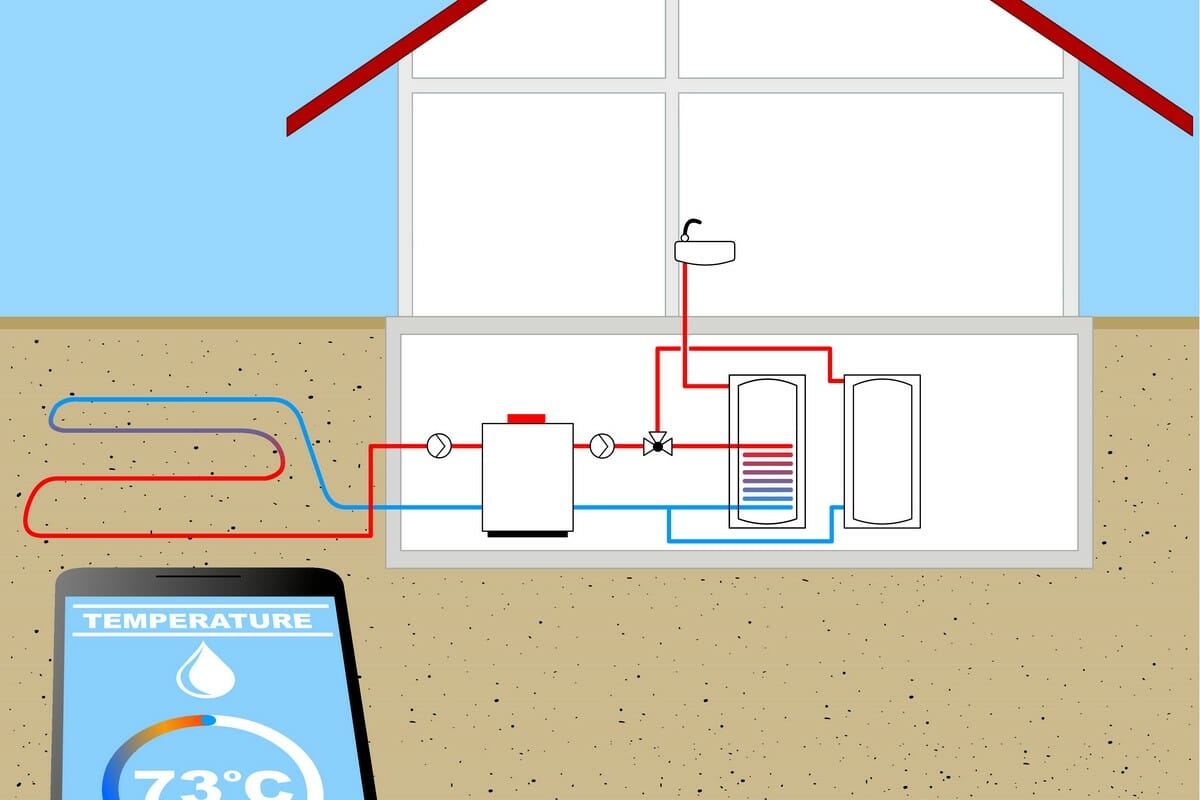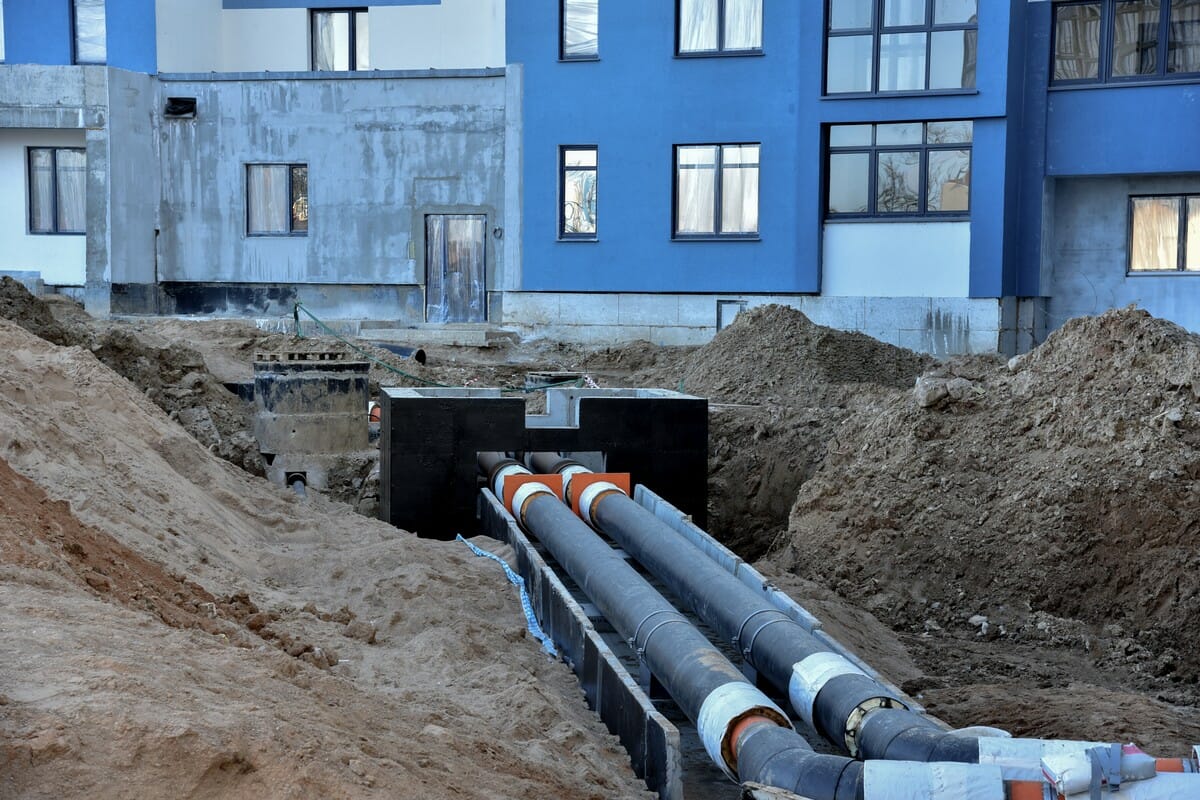Ground Source Heat Pumps
Table of Contents
- 1 - Ground Source Heat Pumps – a Beginner’s Guide.
- 2 - Our Ground Source Heat Pumps
- 3 - Benefits of Ground Source Heat Pumps
- 3.1 - Cost-efficient
- 3.2 - Renewable Energy Source
- 3.3 - Heat Pump Type
- 3.4 - No Need for Planning Permission
- 3.5 - Highly Efficient
- 3.6 - Eco-friendly
- 3.7 - Low Maintenance
- 3.8 - They Work Well in Almost all Climates
- 3.9 - They are Very Reliable
- 3.10 - Quieter Operation
- 3.11 - Beneits of Heat Pumps
- 3.12 - They are Safer
- 3.13 - No Deliveries of Fuel
- 3.14 - They are More Durable
- 3.15 - Talk to the Experts
‘Ground Source Heat Pump’ (GSHP) has become an all-encompassing term for describing a heat pump system that uses the groundwater, surface water, or earth as a source of heat which it extracts so as to transfer it to heat a building.
A ground source heat pump, also called a geothermal system, takes advantage of consistent temperatures found inside the ground to transfer heat in winter to your home and in summer out of your home. Ground source heat pump systems, while providing the comfort of a traditional system, have some of the lowest operating costs of any heating and cooling system available today.
The Mittens Heat Pumps UK provides comprehensive heat pump services including the supply and installation of GSHPs, related financial incentives and compliance.
Ground Source Heat Pumps – a Beginner’s Guide.
What are the Requirements for a Ground Source Heat Pump?

Space
Ground Source Heat Pumps come with outdoor and indoor elements. To install a GSHP system in your home, you need enough space outside. While ground source heat pumps do not have components above ground that take up outdoor space, wells and loops will need to be installed underground. You could use your landscaped area or parking lot for this.
A vertical system requires sufficient space to access the site for the drilling rig, but boreholes are only about 20 cm wide. Those are placed 5-6 meters apart if multiple boreholes are required. A typical horizontal system needs around 700 m2.
Electric Power
Ground source heat pumps require electricity to heat the house. A reliable GSHP system that only distributes space heating will run at a COP of 4.3, meaning the system will need 2.558kWh of electricity at a cost of £349 to produce 11,000kWh of heat.
Although it takes electricity to pump the fluid, a geothermal heat pump is more efficient than any alternative heating system. In reality, for every 1 kilowatt of electricity used, current models will generate as many as 4 kilowatts of power. This is because they do not generate heat but instead move it from the outside to the inside.
Our Guarantee
- Over Six Years Experience
- Unrivaled Experience
- An Exceptional Service
- Unbeatable Value For Money
- Industry-approved Scaffolders
- A Full Range of Heat Pumps Services
- Professional, Reliable and Diligent
- 100% Safety and Satisfaction
Ground Source Heat Pump Costs and Savings
A typical ground source heat pump system will cost between £13,000 and £20,000 to install. Generally, you should budget £1,200 per kW capacity. A typical four-bedroom house built in accordance with building regulations will probably require an 8kW heat pump. A ground source heat pump is expected to cost between £6,000 and £7,000, the other expense being the installation cost which will differ considerably based on the ground conditions.
Ground source heat pumps generally have a low cost of operation. Because it is incredibly energy efficient, you will lower your energy costs – some studies show that by switching from a traditional HVAC to a geothermal heat pump you can drop them by as much as 70%.
Renewable Heat Incentive for Ground Source Heat Pumps
If your installer is accredited by MCS, your ground source heat pump is eligible for the Renewable Heating Incentive (RHI) scheme. RHI is a financial incentive scheme for those who install renewable heat in their buildings.
Under the RHI scheme, you will get quarterly payments for seven years, in addition to efficiency savings. The amount you get back is based on the calculated heat demand in the Energy Performance Certificate (EPC) at your home.
The proportion of renewable heat you use will determine how much of the RHI tariff you get paid. This proportion is determined by multiplying your heat demand (in the EPC) by (1 – 1/SPF). Currently, a ground source heat pump can earn you 20.89 pence per kWh of renewable heat.
Our Ground Source Heat Pumps
Open-loop Ground Source Heat Pumps
This system needs a continuous supply of clean water that can be harnessed to absorb heat from underground water. In this way, water bodies are used to exchange heat between the fluids. The unit draws water directly to the heat exchanger, where heat is extracted. The machine discharges the water into a pump, either to a body of water above ground or back underground.
Closed-loop Ground Source Heat Pumps
Most closed-loop ground source heat pumps use a closed loop to circulate an antifreeze solution buried deep in the ground. In the closed loop, a heat exchanger transports heat between the antifreeze solution and the heat pump’s refrigerant. The loop can be in a vertical position or horizontal position.
Direct Exchange
This system uses a process whereby the refrigerant changes its position back and forth between a gas and a liquid. When the heat is absorbed by the refrigerator, the compressors start to pull the vapour from the suction lines and start the process. It uses a relatively smaller and shorter set of buried tubing which reduces installation costs.
Want to learn more about ground source heat pumps? Call our helpful team on 01273257407 today and we’ll be able to provide you with all the information you need. The Mittens Heat Pumps UK team has years of expertise in all forms of renewable energy technology.
We Are Also Available to Offer Heat Pumps Related Advice
Benefits of Ground Source Heat Pumps
Cost-efficient
Ground source heat pumps will save you substantial money because they are easier to operate than direct electrical heating. They are also cheaper than oil boilers and can be cheaper than gas boilers.
Ground source heat pumps can appear costly upfront but over time they pay for themselves. The average savings are more than 60% for homeowners using these heat pumps. Say an average household produces 75% of their heating from a ground source heat pump – this household can expect to save on energy bills somewhere around an estimated £600 a year.

Renewable Energy Source
Because ground source heat pumps produce their electricity from a renewable source – that is, from the earth itself – a ground source heat pump is considered to be a form of renewable energy. This means you may be eligible for payment under the Renewable Heat Incentive Scheme if you have a ground source heat pump generating heating for your home. The incentive for using ground source heat pumps in 2019 is between £2,380 and £2,585 according to the Energy Saving Trust.
Heat Pump Type
No Need for Planning Permission
Most installations of ground source heat pump systems are likely to fall under permitted development rights, in which case no planning permission is required. This being said, permitted developments come with significant restrictions and requirements that must be met, and it is advised that you consult with your local planning office before any implementation works begin.
Highly Efficient
Efficiency is one of the biggest benefits of ground source heat pumps (and a major factor that can help you save big on energy). A well-installed ground source heat pump system is capable of supplying 3 to 4.5 times the amount of electrical energy it uses to your home in the form of heat energy. It is possible because ground source heat pumps transfer heat, instead of burning fuel.
Eco-friendly
In addition to the financial benefits of installing a ground source heat pump, there are several positive environmental impacts. The high conversion efficiency of a ground source heat pump means you’ll be using less fuel to heat or cool your home. This translates into less power generated from fossil fuels such as natural gas, coal, and oil which means that the amount of greenhouse gas emissions and other pollutants entering the atmosphere is reduced.
You will also reduce your carbon emissions by converting all of your energy consumption from fossil fuel-generated to solar power. Furthermore, installing solar panels on your roof makes for cheap, zero-emission energy to fuel your ground source heat pump system and the rest of your home.
We Are Also Available to Offer Heat Pumps Related Advice
Low Maintenance
Ground source heat pumps do not need much maintenance. They are highly reliable. There are very few moving parts in the machine which means that the pump can have a lifetime of 20 years and the pipes can theoretically last even longer, with a warranty of up to 50 years.
They Work Well in Almost all Climates
Although the efficiency of air source heat pump systems is impacted by ambient temperatures because they use air temperature to absorb and distribute heat, ground source heat pumps are almost entirely unaffected by cold or warm environments. Because of the ambient temperature above ground, the earth remains at an almost constant temperature below.
Extreme climates or areas with particularly wet soils may affect the type of heat pump you want to install, but in general, due to the constant heat of the earth, geothermal heat pumps do work well regardless of the climate.
They are Very Reliable
This is because heat pumps have few moving parts, so they have a smaller risk of failure or picking up faults.
Quieter Operation
Ground source heat pumps produce less noise because they don’t take the heat out of the air and don’t need a ventilator. Because they are placed under the ground, they’re quieter. Most modern heat pumps are designed in such a manner that they make as little noise as possible to prevent putting consumers into the hassle of asking for permission to operate.
They are Safer
Geothermal systems are safe and operationally secure. Your family will not have to think about traditional problems such as carbon monoxide poisoning, because no combustion is involved. Instead of flammable fossil fuels, geothermal technology uses cheap, clean energy from the earth making the whole device healthier than any other product on the market.
No Deliveries of Fuel
Heat is drawn directly from the ground and ground source heat pumps do not require fuel, so if you currently have a system where regular fuel deliveries need to be arranged this can allow you to eliminate this problem entirely. Having a ground source heat pump installed can really simplify the entire process of energy for your property.

They are More Durable
Compared to traditional air conditioning systems, a ground source heat pump is more durable. Traditional air conditioning systems remain efficient for nearly 8 years but the geothermal systems remain effective for about 50 years. They also require less maintenance. Although their guarantees usually last for 25 to 50 years, they can last for as long as 100 years as researched by scientists.
Talk to the Experts
If you are looking for specialists in ground source heat pumps in the UK, look no further than The Mittens Heat Pumps UK. At The Mittens Heat Pumps UK, we are experts in the installation of heat pumps including both ground source heat pumps and air source heat pumps for your home. We have 10 years of experience in the installation, maintenance, repairs, and replacements of heat pump systems throughout the UK.
Our professional installers are fully MCS-accredited and have been trained in renewable energy technologies. They are more than capable of giving you the necessary advice and guidance you need. Call us today 01273257407 and we will be happy to discuss this cost-efficient and eco-friendly energy solution with you.
We Are Also Available to Offer Heat Pumps Related Advice
